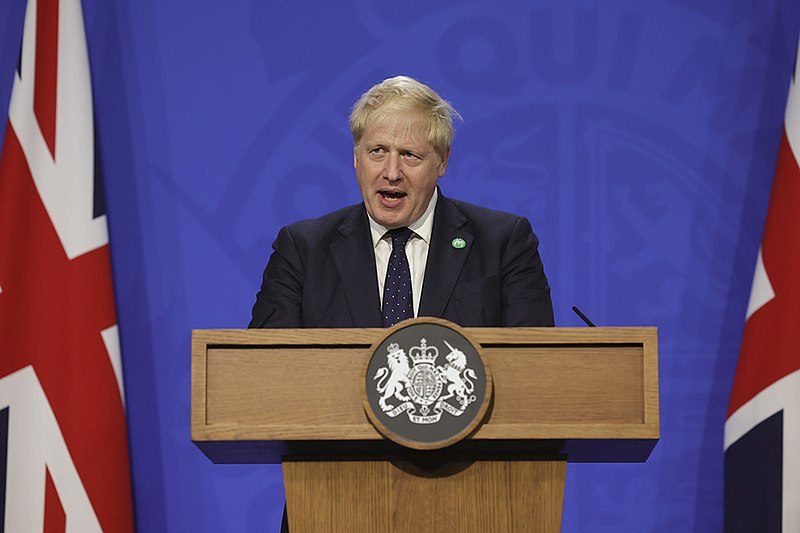Outgoing British Prime Minister Boris Johnson said that cutting down reliance on Russian energy would be a good outcome of the war in Ukraine. This follows efforts by the West to reduce buying of Russian energy products.
Speaking at the site of a nuclear power plant in the eastern UK, Johnson said that in the midst of the ongoing war, one of the good things that would come out of the conflict is that Europe would rely on Russian energy products less.
Johnson added that by cutting down reliance on Russian energy products, the region would not be beholden to Vladimir Putin.
“Out of this catastrophe, of Putin’s war, I think good is going to come, in that Europe will wean itself off Russian hydrocarbons,” said Johnson. “We will no longer be subject, vulnerable, to his blackmail, and in this country, we will have greatly accelerated long overdue reforms and steps to become energy independent, in particular, by rectifying the damage we’ve done to our nuclear industry.”
The foreign ministers of the European Union Wednesday agreed to complicate travel rules for Russians looking to visit Europe but remained divided on whether to issue a widespread visa ban.
While the bloc was divided on a blanket visa ban for Russians, it had yet to be determined what unilateral measures Finland, Estonia, Latvia, Lithuania, and Poland would take as the five countries share a land border with Russia.
The five countries welcomed a suspension of the visa facilitation deal. However, four out of the five countries have called for more action to be taken to significantly limit the visas that would be issued to Russians travelling to the EU following Russia’s invasion of Ukraine back in February.
Czech foreign minister Jan Lipavsky said the bloc’s executive commission would look into other ways to go further on the step. This would include what Lipavsky cited were around 12 million Schengen visas that were already issued for Russians.
EU foreign policy chief Josep Borrell said the suspension of the visa facilitation program would already have a real impact.
“This will significantly reduce the number of visas issued by the EU member states. It’s going to be more difficult, it’s going to take longer,” said Borrell.



 Bangladesh Election 2026: A Turning Point After Years of Political Suppression
Bangladesh Election 2026: A Turning Point After Years of Political Suppression  U.S. Lawmakers to Review Unredacted Jeffrey Epstein DOJ Files Starting Monday
U.S. Lawmakers to Review Unredacted Jeffrey Epstein DOJ Files Starting Monday  Anutin’s Bhumjaithai Party Wins Thai Election, Signals Shift Toward Political Stability
Anutin’s Bhumjaithai Party Wins Thai Election, Signals Shift Toward Political Stability  India–U.S. Interim Trade Pact Cuts Auto Tariffs but Leaves Tesla Out
India–U.S. Interim Trade Pact Cuts Auto Tariffs but Leaves Tesla Out  US Pushes Ukraine-Russia Peace Talks Before Summer Amid Escalating Attacks
US Pushes Ukraine-Russia Peace Talks Before Summer Amid Escalating Attacks  Trump Administration Appeals Court Order to Release Hudson Tunnel Project Funding
Trump Administration Appeals Court Order to Release Hudson Tunnel Project Funding  Trump Lifts 25% Tariff on Indian Goods in Strategic U.S.–India Trade and Energy Deal
Trump Lifts 25% Tariff on Indian Goods in Strategic U.S.–India Trade and Energy Deal  Sydney Braces for Pro-Palestine Protests During Israeli President Isaac Herzog’s Visit
Sydney Braces for Pro-Palestine Protests During Israeli President Isaac Herzog’s Visit  Bosnian Serb Presidential Rerun Confirms Victory for Dodik Ally Amid Allegations of Irregularities
Bosnian Serb Presidential Rerun Confirms Victory for Dodik Ally Amid Allegations of Irregularities  Trump Says “Very Good Talks” Underway on Russia-Ukraine War as Peace Efforts Continue
Trump Says “Very Good Talks” Underway on Russia-Ukraine War as Peace Efforts Continue  China Overturns Death Sentence of Canadian Robert Schellenberg, Signaling Thaw in Canada-China Relations
China Overturns Death Sentence of Canadian Robert Schellenberg, Signaling Thaw in Canada-China Relations  Federal Judge Restores Funding for Gateway Rail Tunnel Project
Federal Judge Restores Funding for Gateway Rail Tunnel Project  Trump Signs Executive Order Threatening 25% Tariffs on Countries Trading With Iran
Trump Signs Executive Order Threatening 25% Tariffs on Countries Trading With Iran  Japan Election 2026: Sanae Takaichi Poised for Landslide Win Despite Record Snowfall
Japan Election 2026: Sanae Takaichi Poised for Landslide Win Despite Record Snowfall  China Warns US Arms Sales to Taiwan Could Disrupt Trump’s Planned Visit
China Warns US Arms Sales to Taiwan Could Disrupt Trump’s Planned Visit  Trump Congratulates Japan’s First Female Prime Minister Sanae Takaichi After Historic Election Victory
Trump Congratulates Japan’s First Female Prime Minister Sanae Takaichi After Historic Election Victory 































